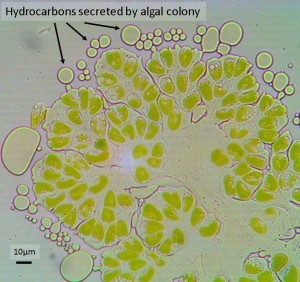Can algae replace oil? Hydrocarbon biosynthetic enzymes identified in microalgae Botryococcus may hold the key to solving global energy problems

Microalgae are currently attracting attention as a source of energy and a potential solution to both energy problems and global warming. In particular, it is hoped that Botryococcus braunii, an algae that produces large amounts of the main hydrocarbon components of petroleum, may prove to be an alternative to oil resources.
However, progress in its development as an energy source has been slow, because the ecology of Botryococcus remains shrouded in mystery and it is difficult to culture in large quantities.
Now, for the first time, Associate Professor Shigeru Okada of the University of Tokyo Graduate School of Agricultural and Life Sciences and his collaborators have described the mechanism by which Botryococcus produces hydrocarbons. The process was completely unexpected.
It had been thought that botryococcene, the major hydrocarbon accumulated in Botryococcus, was created through a similar mechanism to squalene biosynthesis in other organisms, which involves a single enzyme, squalene synthase. But in Botryococcus the group did not find one single hydrocarbon synthase responsible for botryococcene synthesis.
Instead, through EST analysis they identified three enzymes similar to squalene synthase. In addition to a process similar to that in other organisms, the group has also established the complex mechanism by which the combination of these synthase molecules enables Botryococcus to produce hydrocarbons.
Understanding this mechanism will help with more efficient culturing of Botryococcus and mechanisms of hydrocarbon recovery. On the other hand, the discovery of Botryococcus’ unique and complex process of hydrocarbon synthesis has further increased the number of this alga’s mysterious properties.
Press release (Japanese)
Paper
Tom D. Niehaus, Shigeru Okada, Timothy P. Devarenne, David S. Watt, Vitaliy Sviripa, and Joe Chappell,
“Identification of unique mechanisms for triterpene biosynthesis in Botryococcus braunii”
Proceedings of the National Academy of Sciences (PNAS) Published online before print July 11, 2011. doi: 10.1073/pnas.1106222108
Article link (Publication)








